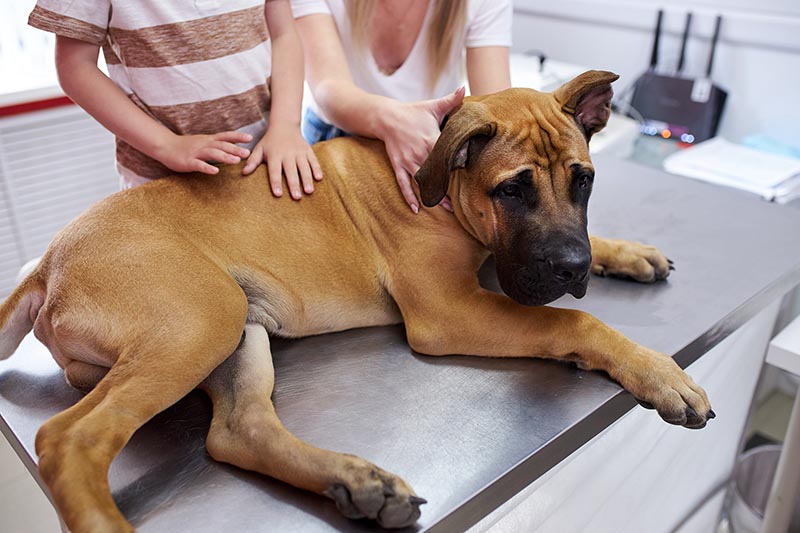
Click to Skip Ahead
Ice cream is a refreshing and delectable treat that most humans can’t resist, especially on a hot summer day. If you’re a dog owner, you know that canines can’t seem to resist the temptation of ice cream either. You may be tempted to share this cool treat with your dog, but can dogs eat mint ice cream or any other flavors?
The short answer is that a lick or two of mint ice cream or many other flavors may not be a problem, but more than that can become a concern. Ice cream in general should never be a regular part of your dog’s diet. Here’s what you need to know.
Why Mint Ice Cream Isn’t an Ideal Food for Dogs
There are a few reasons that mint ice cream shouldn’t be a regular part of your dog’s diet. If your pup licks the remains of an empty ice cream bowl, the overall amount consumed isn’t likely to cause any issues. However, eating more than that in one sitting or licking an empty ice cream bowl every day can cause problems that you and your pup would rather avoid. Let’s look at some potential issues:
1. Mint Toxicity
According to the ASPCA, the essential oils found in mint can be toxic to dogs in high enough amounts. Consuming too much of it can cause gastrointestinal problems like diarrhea and vomiting. A lick of mint ice cream probably won’t cause these signs to develop, but it depends on how sensitive the dog is to the compounds in mint. It’s best to keep your pup away from mint products, including ice cream, whenever possible to avoid the possibility of digestive discomfort and other concerning signs.
2. Lactose Intolerance

Many adult dogs, no matter their breed, are lactose intolerant and cannot properly digest the sugars found in dairy products like ice cream. Consuming ice cream, whether it’s mint flavored or otherwise, can cause signs that result in discomfort and maybe even the need to see a veterinarian. Signs of lactose intolerance include:
These signs typically subside on their own in a day or two, but they should indicate that your dog shouldn’t have dairy products even in small amounts or as occasional treats. If the signs persist for longer than 48 hours, call your veterinarian for guidance. They may recommend a checkup or offer tips for easing the effects and helping your pup get back to their healthy and happy life.
3. Allergic Reactions
Some dogs can be allergic to dairy, which is different from lactose intolerance. While lactose intolerance can cause gastrointestinal problems, a milk allergy manifests as an immune response that results in problems like skin rashes, ear infections, and extensive itchiness. An allergic reaction to dairy can be extremely uncomfortable for your dog, so keep an eye out for signs of a reaction anytime your dog consumes ice cream or any other kind of dairy.
If a reaction is identified, don’t let your dog lick your empty ice cream bowl or consume any dairy at all. Some dogs develop allergic reactions as they age, even if they could handle a small amount of dairy in their diet before.
4. Fat and Sugar Content

Due to its fat and sugar content, ice cream is meant to be a snack or treat, not a daily mainstay. Dogs are susceptible to problems that fat and sugar can cause when consumed too often.
By letting your pup eat ice cream regularly or giving them their own serving even occasionally, you’re adding unnecessary sugar and fat to their diet, which does not benefit their health or enhance their nutrient intake in any way.
Ice Cream Flavors That Should Be Avoided at All Costs
Sugar-Free Mint Ice Cream
Never let your dog consume sugar-free ice cream, even just a lick, because there is a good chance that it contains xylitol, which is extremely toxic to dogs. Xylitol might be a safe sugar replacement for humans to consume, but a dog’s system simply can’t process it properly. Consuming xylitol, even in small amounts, can result in a host of serious problems, such as:
If your dog consumes any food product that contains xylitol, including mint ice cream, contact the Pet Poison Helpline at (855)764-7661 immediately, and head to the nearest emergency veterinary clinic.
Mint Chocolate Chip Ice Cream

While mint chocolate chip ice cream might be a favorite of yours, it can be downright deadly for your dog. Chocolate contains two compounds that are considered toxins to dogs, which are caffeine and theobromine. Dogs are not capable of efficiently processing these compounds the same way that humans can. It also doesn’t take much chocolate to cause poisoning in dogs. For instance, a 50-pound dog could show signs of poisoning after eating just 1 ounce of baker’s chocolate. Signs of chocolate poisoning include:
While it would take a large amount of mint chocolate chip ice cream to cause serious problems, always keep mint chocolate chip ice cream and all other ice creams that contain chocolate away from your pup’s reach, even if it’s just a spoon with remnants of the treat on it.
Frequent Asked Questions
Are Other Flavors of Ice Cream Healthy for Dogs?
Whether it’s mint, vanilla, or strawberry ice cream, all forms of this sweet treat are dairy-based and filled with sugar and fat and contain other ingredients that are not ideal for a pet’s diet. Therefore, no flavor of ice cream is healthy for dogs to eat on a regular basis. If you know that it’s a flavor of ice cream that doesn’t contain toxic ingredients, offering a lick or two to your dog shouldn’t be a problem. However, if you don’t know what’s in the ice cream or you simply aren’t sure about the treat’s safety, it’s best to avoid giving them any.
What Should You Do If Your Dog Eats Too Much Mint Ice Cream?
There is nothing that you need to do if your dog takes a few licks of mint ice cream, as it’s unlikely to cause any noticeable problems. However, if they eat more than that, watch them for signs of negative reactions, such as vomiting diarrhea or stomach pain. If any signs arise, contact your veterinarian, and let them know what you’re witnessing so they can help you come up with a course of action, whether that’s taking steps at home to relieve signs or heading in for professional treatment.
If your dog consumes any amount of mint ice cream that contains chocolate or xylitol, contact the Pet Poison Helpline at (855)764-7661 and/or your closest emergency clinic. Your pet should receive immediate medical attention; scheduling an appointment with your veterinarian can be too time consuming and puts your pet’s health at risk. Still, it’s always a good idea to call your vet no matter what else you’re doing, to ensure that they know what is going on in case they can or need to step in.

A Quick Recap
Mint ice cream is not an ideal treat for your dog and shouldn’t be incorporated into their diet, no matter their age or health. They can have a lick or two occasionally, but shouldn’t have any more than that.So, it’s best to avoid giving ice cream to your dog in general. Also, remember that it’s never safe to give them ice cream that includes chocolate or xylitol.
Featured Image Credit: Brent Hofacker, Shutterstock








